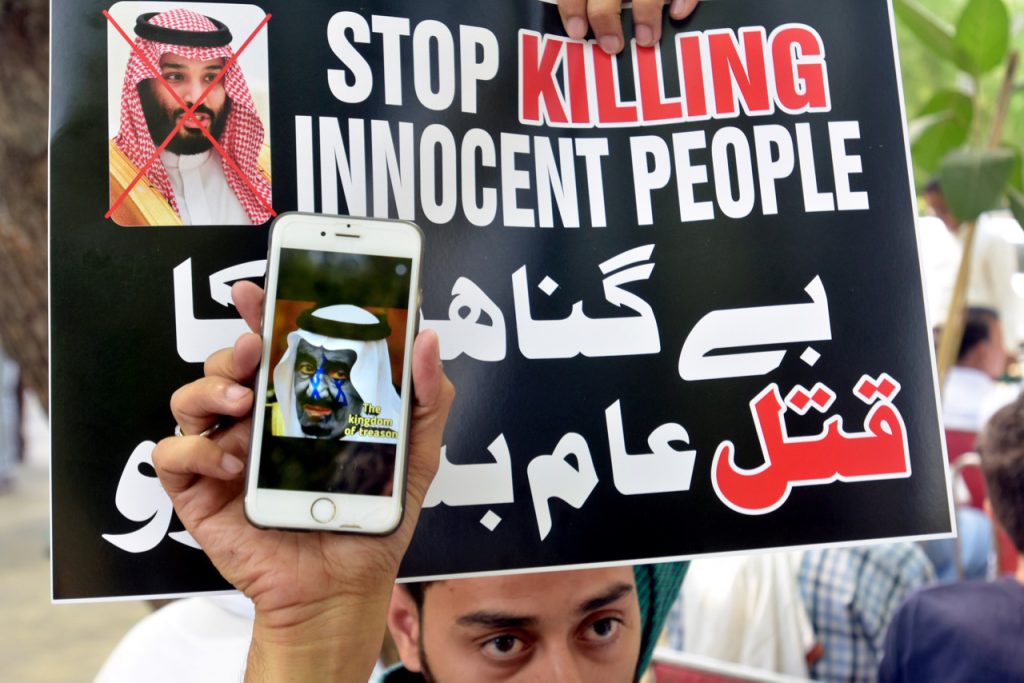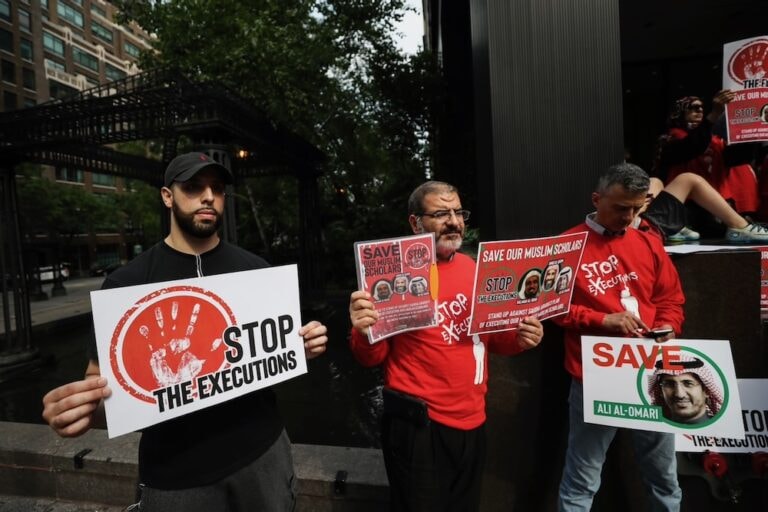The brutal fashion in which Saudi Arabia ended the lives of 37 men on 23 April evoked disgust from the international community. Not just the executions, but the country’s attempt to control the narrative, must be responded to.
Ever since Mohammed bin Salman (MBS)’s appointment as Crown Prince of Saudi Arabia in 2017, the kingdom has advanced an image of the young royal as a reformer.
Scores of articles have pointed out the hypocrisy of this effort. Saudi-bought billboards in London praised MBS as a champion of women whilst he detained women’s rights activists in record numbers; the Future Investment Initiative courted Western investors months after the regime jailed several foreign nationals in the Ritz purge between November 2017 and January 2019.
There is one realm, however, in which MBS has been an agent of change: executions. When MBS took charge in June 2017, the rate of executions per year was on a relative decline, decreasing from 158 in 2015 to 146 in 2017. Now, the trend is reversing. Saudi Arabia is on track to carry out more death penalties in 2019 than it did in any of the last ten years.
Saudi Arabia’s sanguinary justice system is well known both within the activist community and to laypeople. But international outcry especially spikes amid egregious killings, such as the murder of Jamal Khashoggi, and now, the mass execution of 37 Saudi citizens.
On 23 April, Saudi authorities acted on the ruling of the ‘Specialised Criminal Court’ and beheaded 37 detainees. The headless corpse of one, Khalid Al Tuwaijri, was tied to a pole.
The victims were all men. Some were underage at the time of their arrest, including sixteen-year-old Abdulkareem al-Hawaj, in blatant violation of the UN’s Convention on the Rights of the Child. Thirty-three were members of Saudi Arabia’s Shi’a minority, a community that experiences systemic discrimination in the Sunni kingdom. All were tried for terrorism. Court documents reveal that the confessions used to convict the 37 were forced, having been obtained through torture.
A flurry of condemnations soon followed. Most focused on the gruesome nature of the executions. But just as worthy of attention is the language Saudi Arabia employed, during and afterwards.
Let us dissect the charges the men faced. The 37 were found guilty of ‘adopting terrorist extremist ideology, forming terrorist cells’, and harming the ‘peace and security of society’. Many were arrested, however, because of their participation in pro-democracy demonstrations in the Qatif governorate.
The use of terrorist charges as a pretext to liquidate critics has been a longstanding policy of Saudi Arabia. Brian Dooley, who sits on the advisory board of the Lebanon-based Gulf Centre for Human Rights (GCHR), tells IFEX: “[Terrorism] has been so overused that it is now just seen as an excuse to attack, jail, and execute people”.
Supporters of the regime advanced the same empty accusations to push back against criticism on social media – even against expressions of sadness or compassion. In replies to tweets decrying the execution of Mujtaba al-Sweikat—who was set to attend university in the United States—Saudi-aligned Twitter accounts shared a picture of the then-teenager wearing a headband bearing a Shi’a religious slogan. Channeling Islamophobic tropes, the responses implied that al-Sweikat’s all-black attire proved the charges against him true and therefore justified his killing.
Moreover, those who commemorated the 37 were portrayed as terrorist sympathisers, if not terrorists themselves.
Such efforts, coupled with the regime’s use of capital punishment, constitute a two-pronged approach to stifle free speech. While the kingdom attacks those inside the country with physical violence, those outside face anything from smear campaigns to assassination plots.
It’s not a new tactic. Loujain Al-Hathloul and other Women’s Rights activists currently stand trial in Saudi Arabia’s Specialised Criminal Court – the very judiciary that dispensed the death penalty against the 37 – whilst Jamal Khashoggi was painted as a Muslim Brotherhood asset to whitewash his assassination. In both cases, Twitter users who conveyed solidarity were pinned with the same ‘terrorist’ label.
Herein lies the broader implication: ‘terrorism’ has become a catch-all pejorative against criticism, and ‘terrorist’ a descriptor of anyone expressing it.
What can we do? By recognising and exposing this behaviour, we can challenge Saudi Arabia’s use of it. This, in turn, will lend support to voices that would otherwise hesitate to speak out for fear of harassment and threats.
Indeed, allies, particularly if they live in Western democracies, are often those who have the greatest ability to bring about change – if they aren’t bullied into silence. Dooley points out that ‘constituent power is real and underused’; a timely observation given the forthcoming European elections.
He suggests that European citizens research their respective representatives’ stance on human rights violations in Saudi Arabia. If a parliamentarian is outspoken, lend them support; conversely, call out those who either whitewash or support the government. All external allies should find out what their representatives can do to respond to Saudi excesses, and urge them to take action.
Besides putting civic networks to use, there are plenty of other ways to engage. Reporters Without Borders, PEN International, and other press freedom groups have held protests outside the Saudi embassy in London. Attending such demonstrations helps raise public scrutiny over the government’s abuses, bringing them to the forefront of national conversations.
Amnesty International and Human Rights Watch have been active on this issue. Reprieve’s petition calling on British Prime Minister Theresa May to condemn the slaughter of the 37 prisoners is still circulating. Meanwhile, the International Federation for Human Rights (FIDH) cited the executions in its campaign pressing international businesses and broadcasters to not partake in the upcoming Dakar Rally in Riyadh.
Tracking and using hashtags such as #StopSaudiExecutions and #StandWithSaudiHeroes helps enormously in tracking and amplifying these abuses. The use of such hashtags can boost a tweet’s audience from ten to ten thousand, if social media users incorporate them whenever and wherever possible.
The brutal fashion in which Saudi Arabia ended the lives of 37 men evoked disgust from the international community. The executions and the country’s attempt to control the narrative must be responded to. Concerned individuals should continue to use their voices, and, most importantly, their votes. The Crown Prince’s executions are likely to keep breaking records otherwise.



